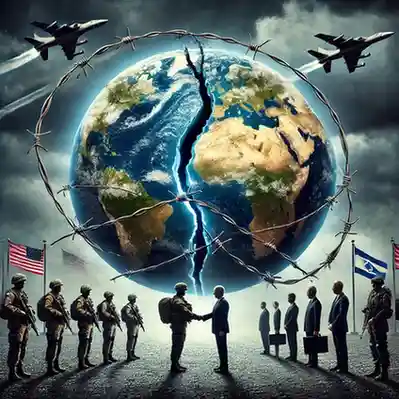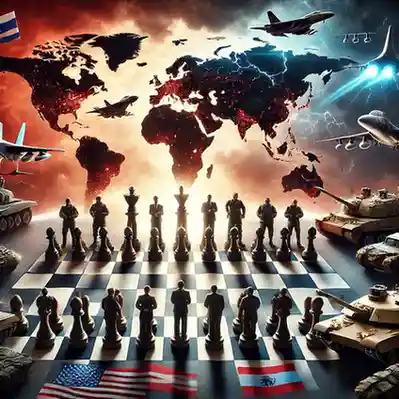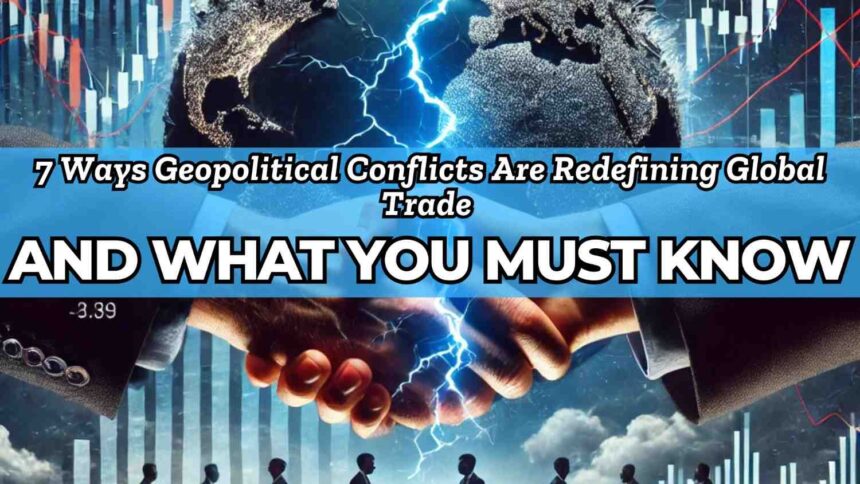Geopolitical Tensions and Trade: How Global Conflicts Are Reshaping the World Economy
In today’s interconnected world, geopolitical tensions and world trade have become very symbiotic. From the Russia-Ukraine war to U.S.-China trade relations, these conflicts and rivalries are reshaping the supply chains, affecting the markets, and changing the global economic scene. In this blog, we are interested in discussing current events regarding geopolitical risks, their effects on international trade, and what businesses and investors ought to know in order to survive in such an environment of volatility.
Introduction to Geopolitical Tensions and Trade
Geopolitical tensions had played an important role throughout history in shaping trade regimes and world economies. Yet, recent trends—great power rivalry, regional conflicts, and economic nationalism—have put imposition of such challenges in hyperdrive. Trade as a tool for political and strategic purposes is thus becoming an accepted state practice, ranging from embargos to punitive tariffs.
This very situation complicates business decisions; hence, corporations must navigate assorted geopolitical risks: supply chains disruptors, cost increases, and regulatory risks. These complexities represent greater competition and, therefore, opportunity in some unpredictable markets.
Important Geopolitical Areas Underpinning Trade Disruption
Russia-Ukraine War
Trade across borders is affected by the backdrop of the ongoing war between Russia and Ukraine. Some of the major impacts include the following:
Energy Markets: Russian gas use by Europe has been put at risk, causing huge energy price rises for Europe and increasing interest in substitutes including renewable energy.
Food Security: Ukraine, a sizable wheat and sunflower oil producer, has caused much unrest for the upward movement of world prices for food.
Sanctions: Trade flows have also been disrupted by Western sanctions on Russia toward oil, gas, technology, and many other sectors.
U.S.-China Trade War in Geopolitical Tensions
The U.S.-China trade war certainly remains one of the major drivers of global trade tensions. Important acts include:
Tariffs: The United States imposes tariffs on billions of dollars worth of Chinese imports, raising cost for businesses and consumers alike.
Technology Restrictions: The semiconductor and advanced technology export controls have heightened confrontation between the two nations.
Supply Chain Diversion: Corporations are diversifying supply chain operations away from China, with many starting production in nations like Vietnam, India, and Mexico.
Middle East Conflicts in Geopolitical Tensions
Conflicts in the Middle East, most notably in Yemen and Syria, disrupt global commerce. Key issues include:
Oil Supply: The Middle East remains a critical supplier of oil, given that instability will lead to oil price volatility.
Shipping Route: The Strait of Hormuz, among the other key oil tanker shipping routes, is often under threat of disruption owing to regional upheavals.
The Ways Companies Adjust with the Changing Politics and Economics in Geopolitical Tensions
The following are some methods that businesses are adapting as a response to geopolitical risks:
Diversification: Companies are diversifying or reducing their dependence on one supplier or location by means of a China+1 strategy.
Localization: Nearshoring and reshoring are bringing business to their homes in geography.
Technology: Employing new methods from AI to blockchain to establish supply chain visibility and efficiency.
Role of Sanctions and Tariffs in International Trade
Sanctions and tariffs constitute a form of economic coercion by governments. Some important examples include:
U.S. Sanctions to Russia: These sanctions have targeted a number of important sectors in the economy including energy, finance, and technology.
U.S.A-Chinese Tariffs: The U.S. imposed tariffs on some Chinese products so it can address the international trade imbalances and also shields some domestic industries.
Sanctions of the EU: The European Union has also put sanctions as reactions to conflicts and to human rights violations.
Such sanctions and tariffs are very powerful in terms of the types of political objectives they serve. However, it often happens that the other side hurts, by not meeting the cost to the businesses and the consumers.

Future Look: What Next for Global Trade?
Looking ahead, several trends are likely to shape the future of global trade:
Decoupling: The U.S. and China will continue decoupling in important sectors such as technology and defense.
Green Trade: Climate change will create increasing demand for green technologies and sustainable trade practices.
Digital Trade: The rise of e-commerce and digital services is, on the one hand, coming with opportunities and challenges for further global trade.
Moving into 2024, keeping up with geopolitical risks, global trade trends, and economic policies will be much more meaningful. The capability to maneuver in such a complex landscape will matter for long-term success for the business leader, investor, and policies maker alike.
Much more than before. The effectiveness of multilateral organizations in reducing trade friction:
Problems at the WTO: A World Trade Organization (WTO) that can no longer prove effective in the mediation of the disputes among superpowers like the U.S. and China has only one way left – unilateral actions
Regionalization of Trade Agreements: Countries have found regional pacts like the Comprehensive and Progressive Agreement for Trans-Pacific Partnership (CPTPP) as well as the Regional Comprehensive Economic Partnership (RCEP) to circumvent deadlocks in trade at the global level.
Expansion of BRICS: And it is going to get bigger with countries like Saudi Arabia and Iran, thus potentially forming a new counterbalance to the Western-dominated trade systems.
Effects of Geopolitical Tensions on Emerging Markets
Currency Volatility: Emerging markets experience most forms of currency devaluation during geopolitical crises due to an outflow of capital; this makes imports costlier, resulting in increased burdens of debt.
Foreign Investment: Disturbance of the geopolitical scenario generates incoming deterrents that will create challenges to foreign direct investment (FDI) and, in turn create slower economic growth in developing countries.
Commodity Dependency: The general lot of emerging market economies is commodity exporters, making them significantly exposed to price swings due to geopolitical events.
The Rising Tide of Economic Nationalism in Geopolitical Tensions
Protectionist Policies: Protectionist measures by which countries seek to protect domestic industries have come to include local manufacturing subsidies as well as restrictions on the inflow of foreign direct investments.
Inducing Critical Industries Back: With such countries, the focus now turns to the reshoring of critical industries-few of which are pharmaceutical products and semiconductors, again with regard to rare earth minerals-in order to reduce any dependency about which geopolitical rivals may engage in coercive practices against one another.
Export Restrictions: Governments are tightening controls on exports of strategic goods, such as advanced technologies, to raw materials in order to protect national security interests.
The Political Role and Function of Technology in Geopolitical Trade Wars and Geopolitical Tensions
Semiconductors: The unending battle ground between the United States and China over supremacy in semiconductors has begun a race towards advanced chips export restrictions from the U.S., while China has significantly increased investments in a domestic semiconductor industry.
5G and Telecommunications: The competition for 5G deployment worldwide has been politicized, with the U.S. striving to keep Chinese companies, such as Huawei, out of crucial infrastructures such as these.
Cybersecurity Issues: Geopolitical tensions increase with the threat of more intense attacks on business, because more sponsors are funded to carry out cyberattacks via trade secrets and supply chains.
Climate Change as Geopolitical Tensions Variable

Resource War: As the earth gets warmer, many parts of the earth are fighting for resources, including water and arable land, which, unfortunately, leads to conflicts between regions, such as Africa and the Middle East.
Green Trade Wars: The shift to green energy has created fresh areas of trade friction, like the EU Carbon Border Adjustment Mechanism (CBAM), which will impose tariffs according to the carbon content of imports.
Renewable Energy Sector Race: Countries that are interested in the sector are competing for dominance, with China leading in the production of solar panels, while the U.S. has invested heavily in wind and battery technologies.
The Cost of Geopolitical Tension for Human Beings
Refugee Crisis: The war between Ukraine and Russia has dislocated millions of people; thus, it poses humanitarian challenges and stretches resources in neighboring states.
Labor Dislocation: These occurrences could lead to loss of employment in affected areas, with manufacturing and agriculture taking the biggest chunk hit by these losses.
Food Insecurity: Access to supplies in vulnerable areas is disrupted due to conflicts and sanctions, leaving the African and Middle Eastern nations suffering the heaviest food insecurity.
The New Age of Risk Management in Geopolitical Tensions
Scenario-grappling is done by businesses to accommodate possible geopolitical shocks ranging from sudden sanctions to supply chain disruptions.
There will be a corresponding increase in demand for political risk insurance as the drive will be on securing investments in unstable locations on behalf of companies.
Governments and businesses are now combining efforts to tackle common concerns such as securing supply chains and fighting cyber threats.

Conclusion:
How to Maneuver through Geopolitical Tensions in 2024 and Beyond
Geopolitical tensions and trade disruptions are here and here to stay, hence having to prepare the business to adapt to such scenarios. Understanding such risks and opportunities would help companies build resilient supply chains, diversify operations, and retain competitive advantage.
Frequently Asked Questions (FAQs)
What are geopolitical tensions?
Geopolitical tensions are instances when nation-states find themselves in a conflict or rivalry because of their political, economic, or strategic interests. Such tensions usually arise from territorial disputes, resource competition, ideological differences, or power equations, significantly altering the dimensions and dynamics of trade, security, and economic stability in a given region or all over the world.
How do geopolitical tensions impact global trade?
Geopolitical tensions impair global trade in several ways:
Causing supply chain disruptions (Russia-Ukraine war affecting grain and energy exports).
Sanctions and tariffs (U.S.-China trade war).
Increased cost due to transportation and production overheads.
What is the U.S.-China trade war?
An ongoing trade conflict between the United States and China, the two largest economies in the world, that started in 2018 with tariffs imposed by the United States on Chinese products in an effort to remedy trade imbalances and theft of intellectual properties. The retaliatory imposition of tariffs by China has resulted in a prolonged trade dispute, disrupting global supply chains, and increasing costs on businesses and consumers alike.
How did the Russian-Ukrainian war affect global trade?
The Russian-Ukrainian war has put several significant effects on global trade:
Energy markets: Disruption in Russian gas exportation to European countries inflated energy prices all over the world.
Food security: Ukraine is one of the major wheat and sunflower oil exporters, and the war has put additional inflationary pressure on food prices all over the globe.
Sanctions: Western sanctions against Russia have strangled trade in oil, gas, technology, etc.
How did the Russian-Ukrainian war affect global trade?
The Russian-Ukrainian war has put several significant effects on global trade:
Energy markets: Disruption in Russian gas exportation to European countries inflated energy prices all over the world.
Food security: Ukraine is one of the major wheat and sunflower oil exporters, and the war has put additional inflationary pressure on food prices all over the globe.
Sanctions: Western sanctions against Russia have strangled trade in oil, gas, technology, etc.
What are economic sanctions, and how do they work?
Economic sanctions are punitive measures levied by one nation or group of nations upon another in the pursuit of political and economic goals. They mainly consist of various forms of trade restrictions, freezing of assets, and prohibiting such countries from conducting financial transactions. Usually, sanctions exert pressure upon governments to change their mindsets, but they can also bring down their economy, affecting the businesses and civilians in the nation under sanctions.
What does “China+1” mean?
The China + 1 strategy is a business strategy to diversify and reduce reliance on China, adding at least one other country as a secondary production base. This strategy serves as a way to mitigate risks from geopolitical tensions, trade wars, and supply chain disruptions. Countries in the competition for outsourced value-added work include Vietnam, India, and Mexico.
How are businesses coping with geopolitical risks?
Incredible diversity in supply chains away from dependence on any single region.
Investing in technologies like AI and Blockchain to improve supply chain visibility.
Employ risk management strategies such as scenario planning and political risk insurance.
Nearshoring and/or reshoring mechanisms.
Long-term Effects of Geopolitical Tensions on the Global Economy
Some of those are Reduced trade and investment, making slower growth globally; Higher inflation due to increased cost of goods and energy; Reconfiguration of supply chain as companies look for more resilient and localized production; Increased regionalization of trade, countries will be able to get integrated economies closer among their regions.
What do tariffs do to international trade?
Tariffs are imposed taxes on an import that makes it costlier for consumers as well as the businesses. Tariffs are a most known use mainly to protect domestic industries from foreign competition. Tariffs can raise trade wars, more expensive business operations, and lowered global trade volume.
What is technology’s role in trade wars geopolitics?
Areas where technology is important in the trade wars of geopolitics include: Semiconductors: the states are competing to establish themselves as the main producer of chips. 5G networks: Major confrontation for the rollout of 5G has become a geopolitical flashpoint; the U.S. has pressured allies to shut out Chinese firms like Huawei. Cybersecurity: With the growing ties in geopolitics, the risks of state-sponsored cyberattacks targeting trade secrets and supply chains also increase.
What is the effect of climate change on geopolitical tensions?
Climate change worsens tensions between countries. They include: More competition over such resources as water and arable land because of scarcity. Population displacements due to extreme weather phenomena will sow seeds for future refugee crises. Propagate further green trade wars whereby countries compete for predominance in renewable energy markets. New coalitions around climate issues will develop, such as the Paris Agreement.
What is the future of global trade in relation to geopolitical tensions?
In the near future, global trade will take the form of:
Closer regional ties would increase the chances of regionalization among countries.
Most would concentrate on creating resilience in their supply chains by diversifying them or localizing them. More eco-friendly trading patterns will emerge-from renewable energy to sustainable practices. Tech competition going on among major powers such as the U.S. and China.
How will businesses shield themselves against geopolitical risk?
Businesses will diversify supplier and markets to avoid dependency on any one region. Political risk insurance and scenario planning while investing in risk management tools. Keep yourself up-to-date with the geopolitical developments and what they could mean with regard to impact. Establish good relations with governments and local partners in strategic market
In which Industries would the Geopolitical Tiny Rugged Men Hit the Most?
Energy: Sanctions and interruption of oil and gas supply.
Technology: Export control and competition with semiconductors.
Agriculture: Disruption of grain exports and rising food prices.
Automobile: Disruption of the supply chain and increasing costs of raw materials.
How Do These Political Tensions Actually Affect the Average Jane Citizen?
The people set to be affected by such geopolitical tensions include the consumers of:
More expensive electronics, cars, and basic foodstuff as a result of higher production or transport costs.
Some bottled bill items, unavailable to him or her in store, due to supply chain disruptions.
Such an economic environment, which may result in “the consumer” obtaining a poor job as well as managerially unreasonable household budgets.
You can also check how Chime Changes the Digital Banking Landscape with Fee-Free Financial Services












